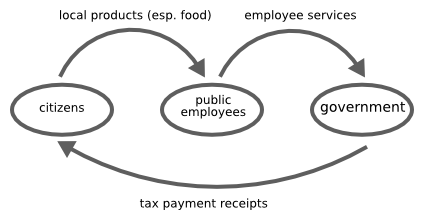This proposal for a “real economy clearing system” for Greece is meant for the perusal by anyone dealing with Greek public finances these days. (Esp. of course for Yanis Varoufakis and Alexis Tsipras if we are lucky enough to catch their attention.)
The following proposal to introduce “moneyless Euros” via clearing system is designed to:
- fix the deflationary spiral of the Greek economy,
- allow recovering of outstanding tax debt from money-wise insolvent taxpayers (reportedly over 60 billion EUR in Greece as of 2015),
- support the Greek national economy and create jobs there,
- reduce the economy's overall need for Euro currency liquidity,
- all while still keeping the Euro as legal tender currency.
We propose to implement this clearing system with network bartering, a technique pioneered on our platform makerfox.com: goods and services are offered in Euro-denominated value on a web-based marketplace. Intentions to order them are recorded there too, resulting in an order graph. A MILP optimization algorithm permanently tries to find subsets of this order graph that can be executed as network barter deals. In each network barter deal, every involved participant receives goods and services, and gives goods and services, and both sides equal out. This way, goods and services are used for payment. No money tokens (“Euros”) are needed for such trading, which means that it works both under deflationary conditions and with monetarily illiquid participants. At the same time, it avoids the pitfalls of parallel currencies (local trust requirements, collective credit problem, Gresham’s Law) – because money is not used as tokens at all here, just as a unit. It is also not a problem for national or international trade, since most jurisdictions allow barter trade and treat it same as trade with money involved, for tax purposes demanding that all legs of a commercial trade are documented with invoices.
Obviously, such many-party barter deals are still less flexible than trading in money tokens, but this can be handled by using a hybrid barter/money system (like Makerfox’s instant deals), which alleviates liquidity issues through bartering as much as possible while relying on money tokens for the rest.
For the Greek population and its public finances, the following template for a barter deal seems especially relevant:

Scenario: Recovering unenforcable tax debt. Citizens pay in kind, and government forwards these products and services to its employees and pensioners (former employees) by paying their wage / pension partially in barter value rather than cash. This additional tax revenue is additional demand for local products and services, supporting the local economy; it also frees up regular monetary tax revenues to pay for necessarily monetary expenses like sovereign debt service.
End note, to illustrate the proposal a bit more: the barter algorithm we propose (nearly) does not suffer from the “coincidence of wants” problem of old-school one-on-one barter. It is a highly flexible, advanced form, made possible by mathematical optimization algorithms and considerable computing resources, able to find network barter deals automatically that fit the above template. Such specific deals will include additional participants as required to make values match up. In our simulations, concrete deals easily include 100 participants and 200 orders each. As an example, this is how one network barter deal would look in practice (circles representing users, squares representing products or services, arrows direction of exchange):
Supporters. The following teams and projects want to support the Greek government in implementing the above proposal, either free of charge or compensated in-kind as proposed for public employee payments above:
- The Makerfox team, wanting (1) to consult the Greek government on how to implement a network barter system and (2) to provide our current network barter marketplace software as a basis.
- The Epelia team, wanting to provide a custom food marketplace that can be easily integrated into a network barter economy and is tailored for direct sale by small-scale producers.


